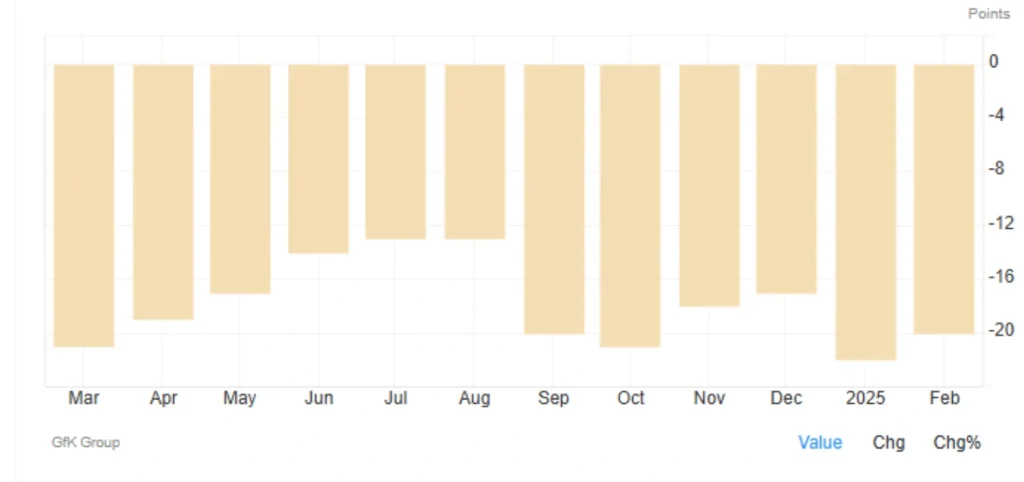
UK Consumer Confidence Sees a Modest Uptick: What It Means?
In February 2025, the UK’s GfK Consumer Confidence Index rose by 2 points to -20, offering a glimmer of optimism for the country’s economic outlook. This slight improvement suggests that consumers are feeling marginally better about their personal finances and the broader economy, despite ongoing concerns about inflation and global trade tensions.
Neil Bellamy, Consumer Insight Director at NIQ GfK, noted that all five core measures of consumer confidence improved in February—a welcome shift after a disappointing decline across the board in January. While falling borrowing costs have helped boost consumer sentiment, lingering threats from U.S. tariff policies under President Donald Trump continue to cast uncertainty over the UK economy.
With inflation hitting a ten-month high and economic growth stagnating in late 2024, this small rise in consumer confidence could be a pivotal signal for what lies ahead.
Read More: UK Economy Contracts in October 2024
Why the Recent Confidence Boost Matters
Early Signs of Economic Recovery
An increase in consumer confidence, however small, can indicate a greater willingness to spend—an essential factor in driving economic growth. When consumers feel more secure about their finances, they’re more likely to invest in big-ticket purchases, stimulating demand across key sectors.
Easing Recession Concerns
Even a modest rise in confidence can help ease fears of an impending recession. It suggests that consumers, though cautious, are feeling slightly more optimistic about their financial futures, which could help stabilize the economy in the short term.
Inflation, Interest Rates, and Monetary Policy
The simultaneous rise in inflation and consumer sentiment may influence future decisions by the Bank of England. While lower borrowing costs have contributed to a slight boost in confidence, central bankers will be monitoring inflationary pressures closely when considering any changes to interest rates.
The Impact of U.S. Trade Tensions
Tariff threats from the United States could disrupt the UK’s trade landscape, creating uncertainty for exporters and adding pressure on economic growth. As global trade relationships continue to evolve, these external factors will be crucial in shaping the UK’s economic prospects.
Economic and Geopolitical Implications
Why Consumer Confidence Is a Key Indicator
The GfK Consumer Confidence Index serves as a barometer for how households feel about their financial situation and the overall health of the economy.
- Rising consumer confidence typically reflects optimism, suggesting consumers are more likely to spend and invest, which supports economic growth.
- Falling confidence signals caution, leading to reduced spending and potentially weaker demand across markets.
Implications for Financial Markets and the Pound
- Stronger British pound: Improved consumer sentiment often boosts investor confidence, potentially driving up the value of the pound.
- Central bank policy shifts: If inflation continues to climb alongside improving consumer sentiment, the Bank of England may reconsider any plans for interest rate cuts.
- Stock market response: A rise in consumer confidence could positively influence retail and consumer-focused stocks on the London Stock Exchange.
The Global Political Landscape
- Impact of U.S. trade policies: Ongoing tariff threats from the U.S. administration could weaken UK export potential, straining international trade relations.
- Post-Brexit trade negotiations: Economic volatility could complicate the UK’s efforts to secure favorable trade agreements with both the U.S. and the European Union.
- Stagflation concerns: A combination of high inflation and weak economic growth could push the UK closer to stagflation—a challenging scenario for policymakers.

A Closer Look at the GfK Consumer Confidence Index
What Does the GfK Index Measure?
The GfK Consumer Confidence Index tracks consumer sentiment toward both personal financial conditions and the broader economy. It assesses five key factors:
- Personal financial situation (current)
- Personal financial situation (future)
- General economic conditions (current)
- General economic conditions (future)
- Willingness to make major purchases
How Does Consumer Confidence Influence Markets?
- Rising consumer confidence typically points to stronger spending habits, which can boost market performance and drive currency strength.
- Falling confidence often suggests economic pessimism, potentially leading to reduced market demand and weaker financial performance.
What’s Next for the UK Economy?
The recent 2-point rise in the GfK Consumer Confidence Index highlights a cautious but positive shift in consumer sentiment. While reduced borrowing costs have contributed to this improvement, the UK economy still faces several challenges. Persistent tariff threats from the U.S., combined with rising inflation and stagnant growth, could hinder long-term recovery efforts.
Economic Outlook and Future Risks
With inflation hovering around 3% and economic growth remaining sluggish, the UK faces the risk of entering a period of stagflation. The Bank of England is likely to proceed with caution, closely monitoring economic data before making any adjustments to interest rates.
If trade tensions with the U.S. persist, the UK could see increased pressure on exports and the value of the pound, creating further obstacles for economic recovery.
Final Thoughts
While the recent rise in consumer confidence offers a glimmer of hope, the road ahead for the UK economy remains uncertain. Much will depend on how inflation, trade relationships, and monetary policy evolve in the coming months.
For now, this modest boost suggests that consumers are beginning to feel slightly more optimistic—but whether this marks the start of a broader economic recovery remains to be seen.
Share
Hot topics

Best broker for gold trading
There’s always been a certain magic about gold. Before online charts and trading applications, people stored their wealth in coins and bars, trusting that gold would retain its value during...
Read more




Submit comment
Your email address will not be published. Required fields are marked *